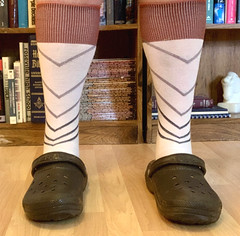 I wear compression socks, which I order from Amazon. Which apparently sells customer data to Facebook; one day about three weeks ago promoted posts for mail-order pretzels disappeared from my Facebook feed. In their place: ads for compression socks. Lots and lots of ads for compression socks.
I wear compression socks, which I order from Amazon. Which apparently sells customer data to Facebook; one day about three weeks ago promoted posts for mail-order pretzels disappeared from my Facebook feed. In their place: ads for compression socks. Lots and lots of ads for compression socks.
I foolishly clicked on one such ad, which promised three free pairs for every two ordered. The second I clicked, a mental grail knight—the very one from Indiana Jones and the Last Crusade—said “You chose poorly.” I’d just signed myself up for a lifetime flood of compression sock advertising on Facebook, Twitter, Instagram, online news aggregators, big-name weblogs, and … you know it’s coming … embedded in personal email messages from friends and relatives.
And the deal? Not so much. Here’s how the buy-two-get-three-free scheme works: each pair of socks sells for $50. That’s top dollar, doubled and then some. Five pair comes out to $20 each, about the normal price for non-prescription compression socks. But the closer I study photos of the socks marketed on Facebook, the thinner they look. I bet they won’t last more than a few washings. In fact I bet they’re actually $10 socks, if that. Thanks, I’ll stick with brands I know, and continue to order from Amazon, even though Jeff Bezos shares my shopping history with every Tom, Dick, and Harry hosier out there.
By the way, I have never bought an online pretzel, nor clicked on a pretzel ad. I have been known to order pretzels with my wings at Hooters. Is that where those ads came from?
I keep remembering a story from The New Yorker, published in the early 2000s, about a grandfather taking his grandson to a Broadway show. It’s set in a near-future NYC: everyone has transmitters on the soles of their shoes, transmitters which broadcast users’ personal shopping histories. Receivers embedded in the sidewalks are connected to eye-level screens on walls and lightposts which constantly broadcast targeted advertising to people walking by. The grandfather and grandson, frustrated in their attempt to walk and talk in peace, take off their shoes. Before long they’re stopped by a “citizen helper” who demands they put their shoes back on. Corporate advertising is protected free speech; “protected” meaning failure to engage with targeted advertising is a crime. They run … but they cannot hide.
I don’t forget stories that turn out, with the passage of time, to have been prescient. So I looked it up. It’s titled “My Flamboyant Grandson,” and it’s online and you can read it here.